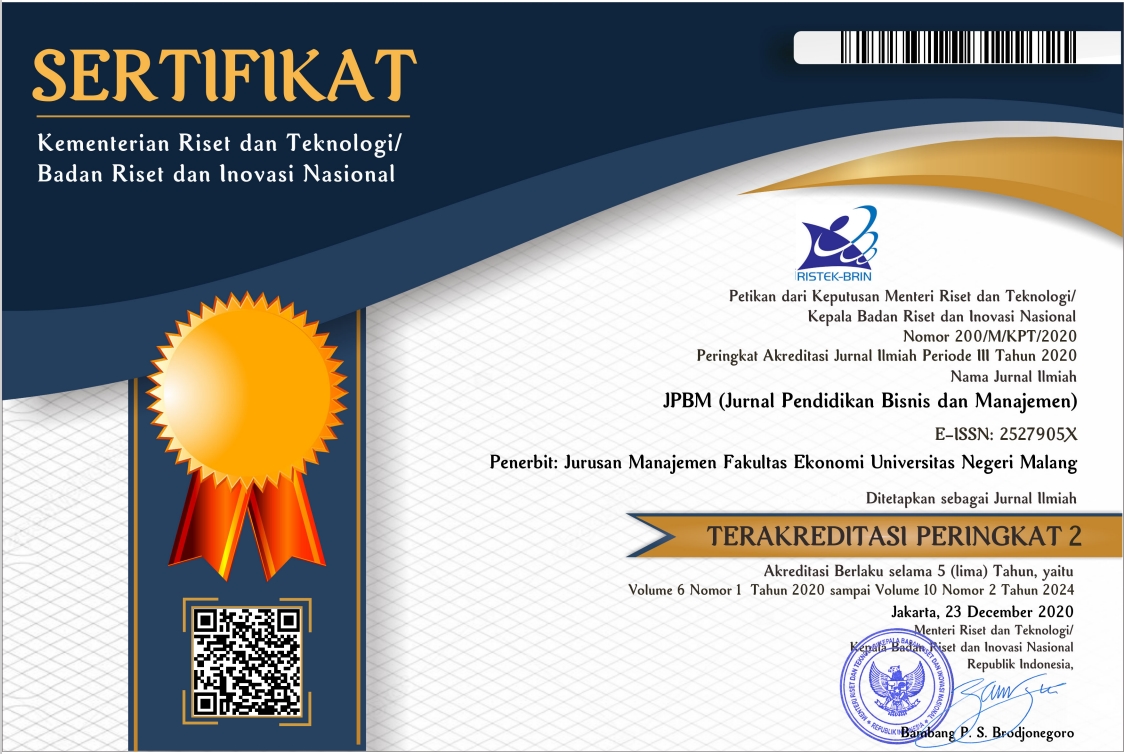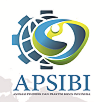Self-Confidence, Learning Motivation and Students Achievement: The Mediating Role of Digital Literacy
Abstract
Accomplishing educational goal is challenging during the Covid-19 pandemic, and it has been covered by adopting technology in educational process. This study examines driving factors affecting students’ learning achievement by incorporating some variables including self-confidence and learning motivation. This study also investigates the mediating role of digital literacy. This study was conducted in a vocational school in Jakarta of Indonesia by involving 188 respondents. A path analysis was involved to gain an understanding for this relationship. The findings remark that students’ learning achievement can be explained by self-confidence and learning motivation. This results also confirm the mediating role of digital literacy in understanding the connectivity between variables.
Keywords: Learning Motivation, Self-confidence, Digital Literacy, Learning Achievement
Full Text:
PDFReferences
Almeida, R. G. D. S., Mazzo, A., Martins, J. C. A., Baptista, R. C. N., Girão, F. B., & Mendes, I. A. C. (2015). Validation to Portuguese of the scale of student satisfaction and self-confidence in learning. Revista latino-americana de enfermagem, 23, 1007-1013.
Alt, D., & Raichel, N. (2020). Enhancing perceived digital literacy skills and creative self-concept through gamified learning environments: Insights from a longitudinal study. International Journal of Educational Research, 101, 101561.
Apriana, D., Kristiawan, M., & Wardiah, D. (2019). Headmaster’s competency in preparing vocational school students for entrepreneurship. International Journal of Scientific & Technology Research, 8(8), 1316-1330.
Bessa, C., Hastie, P., Rosado, A., & Mesquita, I. (2021). Sport education and traditional teaching: Influence on students’ empowerment and self-confidence in high school physical education classes. Sustainability, 13(2), 578.
Chiang, C. L., & Lee, H. (2016). The effect of project-based learning on learning motivation and problem-solving ability of vocational high school students. International Journal of Information and Education Technology, 6(9), 709-712.
Churiyah, M., Sholikhan, S., Filianti, F., & Sakdiyyah, D. A. (2020). Indonesia education readiness conducting distance learning in Covid-19 pandemic situation. International Journal of Multicultural and Multireligious Understanding, 7(6), 491-507.
Fitriwati, D. G. (2018). The effect of motivation on the learning achievement. Indonesian Journal of Integrated English Language Teaching, 4(2), 198-207.
Jannah, S. M. (2019). Analysis Level of Digital Literacy of Digital Natives: How The Impact On Their Self-Regulated Learning?. Ekspektra: Jurnal Bisnis dan Manajemen, 173-185.
Jiang, H., Islam, A. Y. M., Gu, X., & Spector, J. M. (2021). Online learning satisfaction in higher education during the COVID-19 pandemic: A regional comparison between Eastern and Western Chinese universities. Education and Information Technologies, 26(6), 6747-6769.
Jin, K. Y., Reichert, F., Cagasan Jr, L. P., de la Torre, J., & Law, N. (2020). Measuring digital literacy across three age cohorts: Exploring test dimensionality and performance differences. Computers & Education, 157, 103968.
Kaden, U. (2020). COVID-19 school closure-related changes to the professional life of a K–12 teacher. Education Sciences, 10(6), 165.
Karsudianto, F. (2020). Improving students' motivation and self-confidence in speaking using mingling games. Journal of Applied Studies in Language, 4(1), 1-8.
Kim, K. T. (2019). The structural relationship among digital literacy, learning strategies, and core competencies among south korean college students. Educational sciences: theory and practice, 19(2), 3-21.
Kivunja, C. (2015). Teaching students to learn and to work well with 21st century skills: Unpacking the career and life skills domain of the new learning paradigm. International Journal of Higher Education, 4(1), 1-11.
Locke, E. A., & Schattke, K. (2019). Intrinsic and extrinsic motivation: Time for expansion and clarification. Motivation Science, 5(4), 277.
Lubis, I. S. (2018). Digital literacy for learning and academic achievement among students in IIUM (Master's thesis, Kuala Lumpur: International Islamic University Malaysia, 2018).
Mudra, H. (2020). Digital literacy among young learners: How do EFL teachers and learners view its benefits and barriers?. Teaching English with Technology, 20(3), 3-24.
Pambudi, N. A., & Harjanto, B. (2020). Vocational education in Indonesia: History, development, opportunities, and challenges. Children and Youth Services Review, 115, 105092.
Pambudi, N. A., & Harjanto, B. (2020). Vocational education in Indonesia: History, development, opportunities, and challenges. Children and Youth Services Review, 115, 105092.
Panjaitan, N. Q., Yetti, E., & Nurani, Y. (2020). Pengaruh Media Pembelajaran Digital Animasi dan Kepercayaan Diri terhadap Hasil Belajar Pendidikan Agama Islam Anak. Jurnal Obsesi: Jurnal Pendidikan Anak Usia Dini, 4(2), 588-596.
Riswanto, A., & Aryani, S. (2017). Learning motivation and student achievement: description analysis and relationships both. The International Journal of Counseling and Education, 2(1), 42-47.
Rohatgi, A., Scherer, R., & Hatlevik, O. E. (2016). The role of ICT self-efficacy for students' ICT use and their achievement in a computer and information literacy test. Computers & Education, 102, 103-116.
Ryan, R. M., & Deci, E. L. (2020). Intrinsic and extrinsic motivation from a self-determination theory perspective: Definitions, theory, practices, and future directions. Contemporary educational psychology, 61, 101860.
Savage, M. (2015). Digital literacy for primary teachers. Critical Publishing.
Setyowati, D., & Widana, I. W. (2016). Pengaruh minat, kepercayaan diri, dan kreativitas belajar terhadap hasil belajar matematika. Emasains: Jurnal Edukasi Matematika dan Sains, 5(1), 66-72.
Silamut, A. A., & Sovajassatakul, T. (2021). Self-directed learning with knowledge management model on academic achievement and digital literacy abilities for employees of a Thai energy organization. Education and Information Technologies, 26(5), 5149-5163.
Siron, Y., Wibowo, A., & Narmaditya, B. S. (2020). Factors affecting the adoption of e-learning in Indonesia: Lesson from Covid-19. JOTSE: Journal of Technology and Science Education, 10(2), 282-295.
Statti, A., & Torres, K. M. (2020). Digital literacy: The need for technology integration and its impact on learning and engagement in community school environments. Peabody Journal of Education, 95(1), 90-100.
Susilawati, S., & Supriyatno, T. (2020). Online learning through WhatsApp group in improving learning motivation in the era and post pandemic COVID-19. Jurnal Pendidikan: Teori, Penelitian, dan Pengembangan, 5(6), 852-859.
Tran, V. D. (2019). Does Cooperative Learning Increase Students' Motivation in Learning?. International Journal of Higher Education, 8(5), 12-20.
Urhahne, D. (2015). Teacher behavior as a mediator of the relationship between teacher judgment and students' motivation and emotion. Teaching and teacher education, 45, 73-82.
Vargo, D., Zhu, L., Benwell, B., & Yan, Z. (2021). Digital technology use during COVID‐19 pandemic: A rapid review. Human Behavior and Emerging Technologies, 3(1), 13-24.
Widana, I. W., Sumandya, I. W., Sukendra, I. K., & Sudiarsa, I. W. (2020). Analysis of conceptual understanding, digital literacy, motivation, divergent of thinking, and creativity on the teachers skills in preparing hots-based assessments. Journal of Advanced Research in Dynamical and Control Systems-JARDCS, 12(8), 459-466.
Yaniawati, P., Kariadinata, R., Sari, N., Pramiarsih, E., & Mariani, M. (2020). Integration of e-learning for mathematics on resource-based learning: Increasing mathematical creative thinking and self-confidence. International Journal of Emerging Technologies in Learning (iJET), 15(6), 60-78.
Yustika, G. P., & Iswati, S. (2020). Digital literacy in formal online education: A short review. Dinamika Pendidikan, 15(1), 66-76.
Zheng, L., Bhagat, K. K., Zhen, Y., & Zhang, X. (2020). The effectiveness of the flipped classroom on students’ learning achievement and learning motivation. Journal of Educational Technology & Society, 23(1), 1-15.
Refbacks
- There are currently no refbacks.
JPBM (Jurnal Pendidikan dan Bisnis Manajemen) is licensed under a Creative Commons Attribution-NonCommercial-ShareAlike 4.0 International License.
JPBM (Jurnal Pendidikan dan Bisnis Manajemen) is abstracted and indexed in :
















